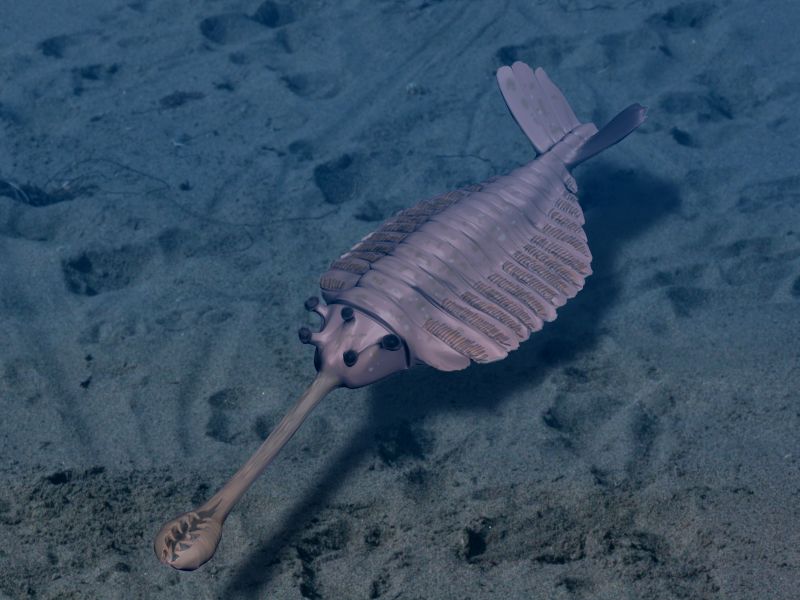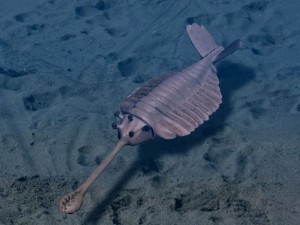Creation Corner
Evolution contradicts itself

Evolution contradicts itself in many ways. The fossil record contradicts all that evolution predicts about how species develop. A recent lecture series shows how and why.
What does evolution assume?
Dr. Walter Veith, in his lecture “Bones in Stones” in his Genesis Conflict series (see Amazing Discoveries), sets out the three things that evolution assumes:
- Simpler life gives rise to more complex life.
- Small species give rise to larger species.
- Change happens slowly and gradually.
The first assumption alone cannot be safe. Any complex life form must have more information in it than a simpler one. And information does not write itself. No system can self-inform. A complex system is a highly informed system, and information must come from the surroundings if the system does not have it to begin with.
What does the fossil record show?

Opabinia regalis, from the Cambrian Burgess Shale. Digital image: Nobu Tamura, CC BY 3.0 Unported License
Dr. Veith’s lecture shows that nothing simple appears in the fossil record. Every life form appears whole, with all parts working. An “intermediate” form would have some sub-systems, but not others. And it could never live.
He further reminds his viewers and listeners that the extinct forms are generally larger than the modern living forms. He shows that in two ways:
- The average size of plants and animals today is smaller than the average size of the life forms we see in fossils.
- Ancient forms are often orders of magnitude larger than their corresponding modern forms.
The Cambrian Explosion
[ezadsense midpost]
Veith demolishes the third assumption by illustrating the Cambrian Explosion. In that hypothetical geological event, all known phyla of life appeared at once. (A phylum is the second-largest group into which scientists organize life forms; the top level is the kingdom.) The worst problem that evolutionists have with the Cambrian Explosion turns out to be the idea that man is the “pinnacle of evolution,” the product of billions of years of trial-and-error. One would naturally assume that the phylum to which mankind belongs, the Chordates, appeared more recently than all the other phyla of the Animal Kingdom. And for a long time, paleontologists comfortably assumed that chordates did not appear sooner than the next period after the Cambrian, the Ordovician. And then they found life forms in the Cambrian layers that are clearly chordates.
These are only a fraction of the contradictions of evolution that Dr. Veith discusses in his 75-minute lecture.
[amazon_carousel widget_type=”ASINList” width=”500″ height=”250″ title=”” market_place=”US” shuffle_products=”True” show_border=”False” asin=”0890512760, 1878026097, 0875523382, 0743290313, 0890514119, 0890514410, 0932766412, 0061472794, 0895262002, 0685459039″ /]
[ezadsense leadout]
Terry A. Hurlbut has been a student of politics, philosophy, and science for more than 35 years. He is a graduate of Yale College and has served as a physician-level laboratory administrator in a 250-bed community hospital. He also is a serious student of the Bible, is conversant in its two primary original languages, and has followed the creation-science movement closely since 1993.
-

 Accountability3 days ago
Accountability3 days agoWaste of the Day: Principal Bought Lobster with School Funds
-

 Civilization21 hours ago
Civilization21 hours agoWhy Europe Shouldn’t Be Upset at Trump’s Venezuelan Actions
-

 Executive2 days ago
Executive2 days agoHow Relaxed COVID-Era Rules Fueled Minnesota’s Biggest Scam
-

 Constitution3 days ago
Constitution3 days agoTrump, Canada, and the Constitutional Problem Beneath the Bridge
-

 Christianity Today20 hours ago
Christianity Today20 hours agoSurprising Revival: Gen Z Men & Highly Educated Lead Return to Religion
-

 Civilization2 days ago
Civilization2 days agoThe End of Purple States and Competitive Districts
-

 Executive1 day ago
Executive1 day agoWaste of the Day: Can You Hear Me Now?
-

 Civilization4 days ago
Civilization4 days agoThe Conundrum of President Donald J. Trump













This is the kind of article that makes me think you have never read a proper book on evolution. None of those three things are assumptions of evolution, so there’s not much point discussing it further. You should read The Blind Watchmaker by Richard Dawkins. It was written while he still did good science books and it’s a perfect introduction to what evolution is really about.
ROFL. The very title of that work tells you how absurd it is. Such a complex machine as a living thing can no more assemble itself than a blind man can make a watch that runs, much less keeps good time.
Terry, that really is a pretty poor response. Yes, many people think that the concept of a ‘blind watchmaker’ is absurd. That’s why Dawkins took the time to write a book explaining why he thinks it’s not absurd.
Your response to that book?
‘The very title of that work tells you how absurd it is.’
Many people would have countered the arguments in the book itself, but you don’t need to worry about, because you can tell just from the title that the idea is absurd.
I think this may be informative as to the depth of your investigation into the concept of evolution.
That’s why you need to read the book, Terry. You will learn something.
rpeh: Re: Your March 25, 2012 at 12:51 pm comment and previous one, recommending Dawkin’s book:
I would not read anything that Dawkins writes. I heard enough of him recently while flipping through the Network channels, attempting to catch some news.
The panel discussion entailed climate change, evolution and academic education. Hawkins arrogantly stated that 40% of the US population believed in a young earth no greater than 10,000 years old. He further went on to imply that this segment of the population was too stupid to be allowed to vote.
In my opinion, the man is an arrogant, jackass, – his ideas and writings, not worthy of serious consideration.
“I would not read anything that Dawkins writes.”
Well, so much for your open-mindedness. OK then, try something by Carl Zimmer. His book Evolution would be a good start.
“his ideas and writings, not worthy of serious consideration.”
How would you know what his writings are like? You refuse to read them.
If you haven’t read the books, you aren’t qualified to judge them. It’s that simple. I’m not a huge fan of Dawkins’ later work, but his early stuff – the book I recommended included – offer great introductions to evolution. His other works, such as ”The Selfish Gene” and ”The Extended Phenotype” are less accessible and tend to focus on specific details, but ”The Blind Watchmaker” should be understandable to any intelligent person.
“The very title of that work tells you how absurd it is.”
Why don’t you just read the book? You may find that the title actually doesn’t tell you all you need to know about it.
“Such a complex machine as a living thing can no more assemble itself…”
Really? You did.
“the three things that evolution assumes:
Simpler life gives rise to more complex life.
Small species give rise to larger species.
Change happens slowly and gradually.”
The first of these claims is simply false: evolutionary theory makes no such claim. The second is equally false. The third is partly true. Change CAN happen gradually. Depending on environmental factors, though, it can also happen with remarkable speed.
I take the point about the third statement, but it’s not one of the basic tenets evolution as Terry claims, merely one of the consequences. In any case, people who prefer the punctuated equilibrium hypothesis would disagree with it. Even strict neo-Darwinists would agree that change ”can” occur very rapidly.
“Any complex life form must have more information in it than a simpler one.”
Not at all. I think we can both agree that humans are more complex than amphibians such as frogs and salamanders, but amphibians tend to have very large genomes. That’s partly BECAUSE we are more complex. Because human embroyos develop in a controlled environment they only need one set of enzymes for the development process. Amphibian embroyos, however, need multiple sets to keep development running in different temperature ranges and the complexity of their genome reflects that.
Of course there isn’t really much of a correlation between genome size and organism complexity. There are two closely related salamander species whose genomes differ in size by a factor of ten. Some amoeba have larger genomes than humans. In fact the largest genome of all – 50 times the size of ours – belongs to a plant.
By the way, in any argument using the concept of information you really need to explain what you mean. Are you talking Shannon content or just a simple character count?
“Veith demolishes the third assumption by illustrating the Cambrian Explosion. In that hypothetical geological event, all known phyla of life appeared at once.”
If Veith actually said that then he is, I’m sorry to say, lying quite outrageously; as a zoologist he won’t be ignorant of the truth. For example there are now at least eleven phyla of plants; ALL are postcambrian. At least six of 35 animal phyla are PREcambrian. Of 32 Metazoan phyla only eleven are first found during the Cambrian (which in any case lasted about 55 million years, so can hardly be described as “all at once.)
“The worst problem that evolutionists have with the Cambrian Explosion turns out to be the idea that man is the “pinnacle of evolution,””
Except evolutionary theory doesn’t say that man – or anything else for that matter – is the pinnacle of evolution.
“the extinct forms are generally larger than the modern living forms”
Sigh. How many counterexamples do I need to provide before you’ll accept that this isn’t exactly the case? Shall we start with coelecanths?
Coelacanth is a living form. No inherent fact about it makes it ancient. It’s ancient only because somebody says its ancient.
Actually living coelecanths, which consist of two species in the genus Latimeria, aren’t ancient at all. No fossil specimens of Latimeria have ever been found. All the fossil coelecanths are from 25 other genera, and Latimeria are at least three times the size of any of them.
Walter Veith is a Seventh Day Adventist creationist and conspiracy theorist. As other have already pointed out, his “three things that evolution assumes” are completely bogus strawmen. Terry, you have been scammed again.
I don’t think so. And I recommend that you play the whole video.
But Terry, his “three things that evolution assumes” ARE completely bogus strawmen, which instantly invalidates any argument based on them.
I dispute that. In fact, that is how I have always heard how evolution was supposed to work, until the disproofs came in.
Dispute it all you like, but they’re still strawmen. There is nothing in the theory of evolution that says organisms must evolve in the direction of increased size or complexity.
That’s not new, by the way: it goes right back to Darwin. One of the first things he noted was that the males of many barnacle species had become extremely small and simple, to the point that they were basically just attachments to the female’s sexual organs.
Either by accident or design you are arguing against a caricature of evolutionary theory. Your refusal above to even read Dawkins’ book doesn’t say much for your open-mindedness. Do you even know what The Blind Watchmaker is about? How about The Selfish Gene or Climbing Mount Improbable?
Then why does common descent always assume that all of life began with one life form, which life form consisted of a single cell?
“Then why does common descent always assume that all of life began with one life form, which life form consisted of a single cell?”
That’s an interesting question and I’m glad you asked it. The fact is that common descent isn’t assuming that; it’s deriving it from the evidence. Darwin thought that modern life could be descended from “a few forms or one” (my emphasis) because, of course, he didn’t have any of the knowledge of biochemistry that we do now.
However analysis of modern life makes it pretty clear that they are all so similar that they come from a single common ancestor. For example all living things use DNA for heredity. There’s no reason why that has to be so. Almost all living things use exclusively left-handed amino acids. The exceptions are all closely-related single-celled organisms. This suggests rather strongly that at some point, before cells actually evolved (no, the first living thing probably wasn’t what we’d call a cell; it would have been far more crude than that) life diverged into forms that used both LH and RH amino acids.
As for the original life consisting of a single cell (really a sort of proto-cell) that’s pretty obvious. You can’t have multicellular life without first having unicellular life, just as you can’t have a brick outhouse without first having bricks.
The fact that endogenous retrovirus’ genetic information is incorporated into our genes shows that all living things have more than one life form in their background. Or do you believe in endogenous retroviruses, Terry?
Tell me this: how did the first virus survive, if it did not have a cell to parasite off of?
No one is suggesting viruses pre-date cellular life forms.
Didn’t you?
I want to start by saying this is by far one of the most respectful forums I have seen on the internet regarding these sorts of usually heated topics and I appreciate reading all the comments.
Terry, sometimes it is hard to follow what is being said. You replied to JasperKent using “you” but in way way that it appears to refer to Paul Burnett.
I believe you interpreted Paul Burnett’s comment to mean “all living things have [THE SAME set of] more than one life form in their background”, building upon the theory of common-descent and thinking that the endogenous retroviruses must have modified that common ancestor. Instead I think he means that for (almost?) any given current species/organism there is evidence that it includes genes from multiple distinct sources (though the particular members of this source set will vary depending upon which current organism/species was selected). Though I could easily be wrong and would welcome anyone wishing to clarify their statements.
Yes, Jeff – I think you understood what I was trying to say.
Yes, Jasper – I was not suggesting ERVs or human ERVs pre-date cellular life forms. Human ERVs make up almost 8 per cent of the human genome, and some of the earliest ERV fragments are thought to have entered the human / pre-human genome millions of years ago.
“I want to start by saying this is by far one of the most respectful forums I have seen on the internet regarding these sorts of usually heated topics and I appreciate reading all the comments.”
That is what has kept me coming back, (and now registering of late); while it sometimes gets contentious here, so long as the tone is respectful it seems the all people’s opinions are given free rein.
I used to read Biblical Archeology Review and those guys and gals were downright nasty to one another…all in good fun of course, academicas are such timid souls at heart. [\Gross overgeneralization]